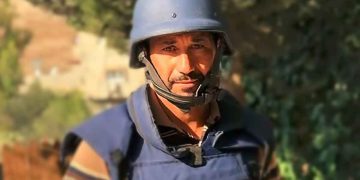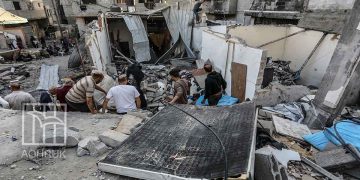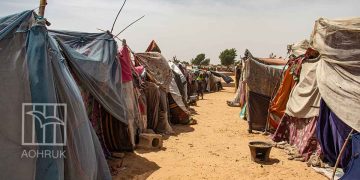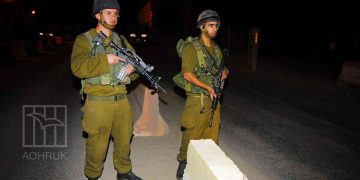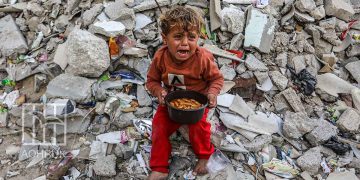On Thursday, 09 January, 2025, Arab Organisation for Human Rights in the UK (AOHR UK) organised a webinar to discuss the critical challenges surrounding the Palestinian Authority’s actions in Jenin, including the suppression of press freedom, the humanitarian crisis, and the broader implications for Palestinian human rights. The event aimed to shed light on these pressing issues while exploring the role of donor countries, regional media, and international solidarity in holding the Palestinian Authority accountable and advocating for justice.
The panel featured distinguished speakers, including Malik Ben Achour, Member of the Senate of Belgium; Richard Boyd Barrett, Member of the Irish Parliament; Jim Moran, Former United States Representative; Aidan White, Founder of the Ethical Journalism Network; Bill Law, Editor of Arab Digest; Booker Ngesa Omole, Kenyan Political Activist; and Dr. Mehmet Çelik, Editorial Coordinator at Daily Sabah. Each speaker provided unique perspectives on the topics discussed, offering critical insights into the ongoing challenges and potential pathways to accountability.
TD Richard Boyd Barrett began his remarks with a firm condemnation of the Palestinian Authority’s (PA) decision to shut down Al Jazeera’s offices, describing it as an attack on freedom of expression and a blatant attempt to suppress independent journalism. He also denounced the killing of Shatha Al-Sabah, a young journalist who was known for her trusted coverage of events in Jenin. He described her death, allegedly at the hands of Palestinian Authority security forces, as “absolutely horrendous” and emblematic of a broader effort to censor criticism of the PA’s siege on Jenin.
Richard detailed the devastating impacts of the siege, highlighting the destruction of vital infrastructure, including power and water supplies, which has left residents of the Jenin refugee camp struggling to survive. He called the actions of the PA “truly horrendous” and drew a stark comparison to the Israeli occupation, stating, “It is tragic that the Palestinian Authority is echoing the brutal tactics of the Israeli occupation.” He pointed to the systematic targeting of journalists by Israeli forces, which he said had resulted in the deaths of over 200 journalists in Gaza in the past year alone. This, he argued, reflected a deliberate strategy to silence those exposing Israel’s crimes and genocide against the Palestinian people.
In his critique, Richard expressed dismay at the PA’s mirroring of these tactics, particularly against Al Jazeera, one of the few outlets willing to expose Israel’s actions. He attributed this to the PA’s continued commitment to the Oslo Accords, which he described as a “failed peace process” that has served as a pretense for Israel to deepen its occupation. Richard criticised the PA for adopting the rhetoric of the occupation by demonising young Palestinians resisting Israeli brutality. “Under international law, people have the right to resist an occupation,” he stated, adding that the PA’s actions against these young resistors were both shocking and indicative of divide-and-rule tactics employed by colonial powers.
He emphasised the need for the world to confront Israel’s illegal annexation of Palestinian territories and its apartheid regime, calling it a “brutal, colonial, murderous regime.” Richard urged immediate action to dismantle this regime and to unequivocally support the Palestinian people in their legitimate resistance. He also stressed the importance of protecting journalistic freedom, condemning any attempts by the PA or others to suppress the media’s role in exposing crimes against the Palestinian people.
He concluded with a powerful call to recognise that “the Palestinian people have every right to resist,” urging solidarity from all who believe in human rights and justice.
Jim Moran opened his remarks by pointing out to the difficult position of the Palestinian Authority (PA) but criticised their actions, particularly the suppression of free speech and violence against journalists. He drew parallels between the PA’s actions and the Israeli military’s assassination of Shireen Abu Akleh, a renowned journalist, whose killing by a sniper remains unaddressed by both the U.S. and Israeli justice systems.
Moran highlighted the damaging consequences of the PA’s behavior, noting that their suppression of Palestinians and violation of human rights only serves to gain approval from the Israeli government and its military forces. He argued that the PA’s attempts to align itself with Israel and gain favor with allies like the United States, particularly the anticipated Trump administration, come at the cost of their legitimacy among Palestinians. He stated, “The more they do that, the more they suppress Palestinians, the more violence, the more violation of human rights, the more approval they will get from this Israeli government.”
He warned that such actions echo the PA’s loss of support, similar to what happened in Gaza, and that their suppression of dissent, particularly in Jenin, undermines their credibility. Moran emphasised the urgent need for Palestinian leadership that can unite the people and speak on their behalf.
Turning his attention to the broader crisis, Moran described the atrocities in Gaza as genocide, citing the deaths of over 46,000 people, the majority of whom were women and children, as well as the thousands buried under rubble and over 100,000 injured. He expressed his belief that the current Israeli government aims to take control of Gaza and significant parts of the West Bank, drawing a chilling comparison to the treatment of Indigenous peoples in North America. “Who they don’t kill, they’ll put into reservations. In this case, refugee camps,” Moran said, condemning this as a violation of the principles upheld by the U.S., Europe, and much of the world.
Moran concluded by stressing the moral obligation of the international community to speak up against these actions. He called on the world not to remain silent but to raise its voice against the injustices faced by Palestinians. He commended the webinar for providing a platform to address these issues, asserting that such discussions are essential to countering the silence and complicity of the global community. “We have an obligation to speak up and not just stand on the sidelines and mutely observe this without raising our voice,” he declared.
Malik Ben Achour began his remarks by expressing agreement with the points made by previous speakers, particularly regarding the actions of the Palestinian Authority (PA) against Al Jazeera. He highlighted the troubling similarity between the PA’s narrative toward Al Jazeera and the narrative used by the Israeli government when it banned the channel last May during its colonial war of aggression against Gaza. He emphasised that this alignment is particularly alarming as tensions escalate between the PA and Palestinian militants in the northern West Bank, with devastating consequences.
Ben Achour stressed that the PA’s actions create the perception that it shares a common enemy with Israel: the Palestinian resistance. This perception, he argued, further erodes the PA’s already fragile credibility among the Palestinian population, effectively placing it on the same side as the occupation forces. He pointed out that the PA has adopted the same repressive tactics against journalists as Israel. This, he said, is a deeply cynical and misguided attempt by the PA to prove its administrative competence to the U.S. and Israel, particularly regarding Gaza, but it is a calculation that is both naive and harmful.
He underscored the critical importance of unity within the Palestinian national movement, asserting that Israel will continue to exploit every opportunity to prevent such unity. The repression, arrests, and even killings of Palestinians by the PA, he noted, are devastating for the broader Palestinian struggle for liberation. “The fact that Palestinians arrest, brutalize, or even shoot to death other Palestinians is a terrible thing for the whole Palestinian struggle itself,” Ben Achour stated emphatically.
On a broader level, Ben Achour criticised the West’s historical claim to being the sole legitimate representative of these ideals, arguing that Gaza represents a turning point in exposing the falsehood of such claims. “The double standard with which the major Western capitals treat the Gaza issue is crystal clear,” he declared. He called for the international movement for Palestine to play a pivotal role in elevating the Palestinian flag as a global symbol of the struggle for equality and justice.
However, he emphasised that for this vision to be realised, Palestinian actors must embody exemplary respect for human rights in their legitimate struggle for liberation. The ongoing repression in the West Bank, he noted, undermines this ideal and is particularly damaging at a time when the world is witnessing the collapse of humanity in Gaza over the past 15 months.
Ben Achour concluded by reiterating the urgent need for Palestinian unity and the international community’s role in amplifying the Palestinian struggle for liberation and justice. He expressed hope that the Palestinian cause would continue to inspire global movements for human rights and equality while urging all Palestinian actors to uphold the principles they fight for.
Aidan White began his contribution by agreeing with many of the points raised by previous speakers, while emphasising the broader, global damage being done to democracy, justice, and human rights. He pointed out that the harm inflicted by recent events in the West Bank and Gaza extends far beyond the region, undermining these core principles on an international scale. White highlighted that the latest developments serve as a stark reminder to journalists that independent reporting on this war has been effectively outlawed—not only by Israel but now also by the Palestinian Authority (PA).
White described the PA’s actions, particularly its targeting of Al Jazeera, as an act of desperation. He linked this to their apparent attempt to establish a role in the administration of Gaza during the post-war phase ahead of the new Trump administration’s tenure. However, White argued, this effort is both futile and damaging, as Israel has made it clear that it would not entertain such involvement. He lamented that the PA’s repressive measures against journalists and its alignment with Israel’s hostility toward Al Jazeera have caused significant and irreparable harm to its credibility and the broader struggle for Palestinian liberation.
Discussing Al Jazeera’s critical role in covering the war, White noted that the network has been the only international broadcaster to provide exhaustive and meticulous reporting since the onset of the war. He condemned the baseless accusations of incitement used to justify attacks on the network, calling it a display of prejudice against journalists committed to truth-telling. White revealed the alarming scale of the violence, with around 150 journalists killed since the beginning of the war, many of whom were deliberately targeted. He emphasised that international courts now possess concrete evidence of Israeli war crimes against journalists, which have violated international humanitarian law.
He condemned the international community’s silence, particularly the inaction of Israel’s allies in the democratic world, as deeply troubling. “When the world’s democracies say nothing and stand aside, it appears that attacking journalists, targeting independent media, and ignoring international law can be done with impunity,” White remarked.
White concluded by calling for a renewed commitment to protecting democracy, free speech, and press freedom, not only in the Middle East but also in Western capitals such as Washington, London, and Paris. He underscored the need for these nations to recognise the profound losses being sustained for the future of democracy. “Above all,” he said, “freedom of the press and the right of journalists to work without intimidation or threats must be a fundamental part of the future—not only for all of us but especially for Palestine and its people.”
Dr. Mehmet Çelik began his remarks by echoing the sentiments of the previous speakers, agreeing wholeheartedly with their observations and critiques of the Palestinian Authority (PA). He highlighted a critical issue in the Palestinian struggle: the suppression of alternative voices. Over the years, the Western mainstream media has often been criticised for its biased coverage of events in the occupied territories. However, Dr. Çelik noted, with the emergence of alternative media platforms that offer truthful accounts of the occupation, oppression, and genocide in Gaza, it is particularly troubling that the PA—a body that claims to represent Palestinians—is silencing these essential voices.
Dr. Çelik described this as a significant obstacle to the Palestinian struggle, calling it a “huge problem” for the movement’s credibility. He further addressed the longstanding crisis of legitimacy faced by the PA, which he said predated the recent Gaza war and genocide. This crisis, he argued, is exacerbated by the PA’s actions, which often mirror those of the Israeli occupation. “How is this different,” he asked, “when Israel is raiding the West Bank and the PA is doing the same to Palestinians? When Israel deprives Gazans of electricity, water, and basic needs, the PA is doing the same in Jenin.”
He drew attention to the hypocrisy of condemning Israeli actions, such as targeting and killing journalists, while the PA adopts the same tactics. This, he argued, fundamentally damages the PA’s legitimacy as a representative of the Palestinian people. “What is the legitimacy of the PA if they are doing the same thing as the Israelis?” he questioned. Dr. Çelik emphasised the severe blow this crisis of legitimacy delivers to press freedom and the broader Palestinian struggle, noting that it not only undermines the PA’s standing but also risks legitimising the occupation and genocide taking place in the territories.
Dr. Çelik acknowledged the inhumane practices, such as raids and deprivation of basic needs, as discussed by previous speakers. However, he focused on two key issues for moving forward. First, he stressed the importance of supporting alternative voices, including media outlets like Al Jazeera and TRT, as well as individual journalists working independently to shed light on the realities in the occupied territories. He called on the international community and supporters of the Palestinian struggle to prioritise these voices and ensure their protection.
Second, he highlighted the urgent need for Palestinian unity and leadership. Dr. Çelik also reiterated that the PA has failed to provide the legitimate leadership required for uniting the Palestinian people. “It is time for unity,” he stated, calling for a credible leadership that can truly represent and advance the Palestinian cause.
In closing, Dr. Çelik underlined the gravity of the situation, noting that the actions of the PA are not only damaging its own legitimacy but also contributing to the broader narrative that seeks to legitimise the occupation and genocide in the occupied territories. He urged the international community and Palestinians to address these critical issues to ensure a unified and credible representation of the Palestinian struggle.
Bill Law began his remarks by aligning himself with the observations of previous speakers, strongly condemning the actions of the Palestinian Authority (PA) in Jenin. He described these actions as part of a long-standing pattern of collaboration with the Israeli Defense Forces (IDF) and the Israeli government in the colonisation of the West Bank. Law criticised the PA leadership for what he termed a “fantasy” of gaining favor with Israel and Donald Trump to emerge as winners in Gaza, calling this belief a “pipe dream” and a “fallacy.”
He expressed particular outrage at the killing of journalists, including the young journalist Shatha Al-Sabah, allegedly at the hands of the PA. Law described this act as “appalling cruelty” and a testament to the depravity of the PA, highlighting how deeply it has strayed from its role as a representative of Palestinian aspirations. Reflecting on his conversations with Palestinian friends in the West Bank, he noted that while many Palestinians harbor deep contempt for the PA, they are too fearful to voice their opinions openly.
Law drew attention to the complicity of Western media in perpetuating bias toward Israel. As a former BBC journalist, he critiqued outlets like the BBC, The New York Times, and The Washington Post for their disproportionate bias, which he argued contributes to the silencing of Palestinian voices. He expressed frustration at the treatment of journalists covering the war, citing the staggering number of over 200 journalists killed, many of whom were deliberately targeted by Israeli forces.
Law emphasized the importance of humanising these tragedies by naming victims to ensure they are remembered as individuals, not mere statistics.
Law praised Al Jazeera for its courage and high-quality journalism in covering the war, describing its efforts as “enormous.” He condemned the PA’s harassment of the network and the shuttering of its Ramallah bureau, calling these actions an attack on press freedom. However, Law also called out Western journalists for their silence and lack of solidarity with their colleagues risking their lives to report the truth. “The number of journalists who have died in this war is unprecedented,” he remarked, urging Western media to stand up for their colleagues and confront the ongoing suppression of journalism.
Law concluded by highlighting the perilous conditions for journalists across the Middle East, not just in Palestine but also in Lebanon and other parts of the region. He lamented the lack of attention to the plight of jailed journalists and called for greater solidarity, support, and advocacy from the West. “We live in very perilous and dangerous times,” he said, urging action to protect those striving to speak truth to power in the face of immense risks.
Booker Ngesa Omole began by praising Al Jazeera for its crucial role in delivering factual and real-time news from the occupied Palestinian territories to the African continent, contrasting its reporting with that of international corporate media, which he accused of spreading lies about Palestinians. Omole highlighted the privilege of having Al Jazeera as a reliable source of alternative news for the Global South.
Omole drew parallels between the Palestinian struggle for liberation and Africa’s fight against colonisation, describing both as battles against settler colonialism and exploitation. He posed a critical question: “In whose authority does the Palestinian Authority (PA) act?” He argued that the PA lacks legitimacy and popular support from Palestinians, as it was a creation of the United States and Israel under the Oslo Accords. He noted that while the Oslo Accords were supposed to lead to Palestinian statehood based on the 1967 borders, the PA has been rendered powerless, with the real control in the West Bank wielded by the Israeli occupation.
Omole critiqued the PA’s role as a collaborator in the occupation, questioning its ability to protect journalism or the rights of Palestinians. He argued that expecting the PA to uphold press freedom, particularly for Al Jazeera, is unrealistic, as the PA itself is complicit in advancing the interests of the Zionist occupation. He pointed to the lack of elections in the PA for over 17 years and its loss of legitimacy, asserting that the PA derives its authority from imperialist powers and the Zionist entity, not from the Palestinian people.
On the subject of journalism, Omole argued that in the context of settler colonialism, journalists must stand with the oppressed. “There can never be objectivity when dealing with a powerful Zionist entity supported by the United States that is carrying out genocide on a daily basis,” he declared. He called for solidarity with Palestinians as the moral responsibility of journalism.
Omole expressed skepticism about the role of international law, which he claimed has been hijacked by the United States. He criticised the failure of international institutions to hold figures like Netanyahu accountable despite evidence of crimes. He asserted that relying on international law to protect entities like Al Jazeera in the West Bank is unrealistic, given the complicity of imperialist powers in the ongoing genocide and occupation.
In closing, Omole framed the Palestinian struggle as part of a broader fight against imperialism. He declared, “In our correct analysis, we think that imperialism will be buried in Gaza,” underscoring his belief in the eventual triumph of anti-imperialist resistance movements.
During the webinar, a question was posed: “Whose interests are advanced by the closure of Al-Jazeera in Palestine, and how do you assess the implications of this action on press freedom and the public’s fundamental right to access accurate information?” In response, the speakers shared their insights, with Mr. Richard Boyd Barrett identifying the primary beneficiaries of the closure of Al-Jazeera as the Israeli occupation forces and their Western sponsors, who aim to suppress the truth about apartheid, illegal settlements, annexation, and genocide. He commended Al-Jazeera’s role in truth-telling, particularly in exposing the plight of Palestinians and challenging biased Western media narratives.
Richard noted that the actions of the Palestinian Authority (PA) in suppressing Al-Jazeera align with those of the occupation, a decision he described as shocking, self-defeating, and ultimately harmful to the Palestinian cause. He stressed the importance of continuing to tell the truth, particularly in Western countries, and holding governments accountable for their support of oppression and suppression of free speech in Palestine.
Similarly, Jim Moran argued that the closure of Al-Jazeera benefits the Israeli government, the right-wing settler movement, and the Western media and money that support Israel. He highlighted ongoing efforts by Israeli lobbying organizations, such as AIPAC, to shut down Al-Jazeera in the United States, including attempts to strip the network of its press credentials and classify it as a foreign agent.
Moran praised Al-Jazeera as a vital source of truthful reporting, particularly in a media environment dominated by pro-Israel narratives. He emphasised that the suppression of Al-Jazeera serves to prevent discussions of genocide in Gaza and the suppression of human rights in the West Bank. Despite these challenges, Moran expressed hope in Al-Jazeera’s continued efforts to bring attention to the Palestinian struggle.
Aidan White took a broader perspective, arguing that the closure of Al-Jazeera reflects a global erosion of truth-telling, free speech, and democracy. He linked this to the rise of corporate and political powers that challenge the veracity of information, citing the actions of figures like Elon Musk and Mark Zuckerberg as part of a trend towards a “post-truth era.”
White emphasised that the suppression of Al-Jazeera is part of a larger play for control over information and public discourse. He expressed concern that the presidency of Donald Trump would exacerbate this issue and called for a renewed commitment to the values of free speech, democracy, and truth-telling.
Dr. Mehmet Çelik highlighted the widespread harm caused by the closure of Al-Jazeera, particularly to families directly affected by the occupation and to Palestinians displaced and living as refugees. He noted that the closure undermines the credibility of those claiming to support Palestinian rights while aligning the PA with the actions of a colonial settler regime.
Çelik argued that this action diminishes the ability of the international community to see the reality on the ground and predicted that it would ultimately backfire on the PA. He underscored the need for journalism to stand firmly on the side of the oppressed and rejected calls for “objectivity” that fail to acknowledge the power imbalance in the war.
Booker Ngesa Omole described the closure of Al-Jazeera as a confirmation of the network’s credibility and its role in providing truthful reporting, particularly to the Global South. He argued that this incident would only enhance Al-Jazeera’s legitimacy and strengthen its position as a counterbalance to the biased narratives promoted by the global North.
Omole framed the closure as a temporary setback in the broader Palestinian resistance, asserting that history demonstrates the eventual triumph of oppressed peoples. He expressed confidence in the resilience of the Palestinian struggle and the growing solidarity it receives worldwide, particularly in Africa.
Mr. Malik Ben Achour expanded on this, describing Palestine as “the world in miniature,” encapsulating a global struggle between forces seeking to destroy the centrality of truth, free speech, and international justice, and those fighting for justice and equality. He referenced the U.S. Congress’s actions threatening the International Criminal Court (ICC) and its prosecutor as a direct attack on global justice. Ben Achour argued that this struggle is emblematic of broader cultural hegemony, citing Antonio Gramsci, and called for defending universal values inherited from pivotal moments in history, such as the French Revolution.
Bill Law criticised the closure of Al-Jazeera as a deliberate attack on critical journalism, pointing out that this action benefits authoritarian regimes in the Gulf States and Egypt, which have long sought to silence the network due to its independent and courageous reporting.
Law also underlined the importance of supporting independent journalism in the face of increasing suppression, stressing that the closure of Al-Jazeera is a direct assault on the principles of press freedom and the right to access accurate information.
During the webinar, another question was raised: “What actions should donor countries take to hold the Palestinian Authority accountable and address issues such as press freedom and the humanitarian crisis in Jenin?” In response, the speakers shared their thoughts, with Mr. Jim Moran stating that the United States is the root of the problem, given its outsized influence as the largest donor and political backer of Israel. He emphasised that U.S. military aid, economic support, and political cover allow Israel to act with impunity. Moran described the Israeli lobby’s control over the U.S. Congress, stating that elected officials are pressured to align with the lobby’s agenda or face electoral defeat.
He expressed concern over the continuation of the Abraham Accords under the Trump administration, predicting further economic integration between Israel and authoritarian regimes like Saudi Arabia and the UAE, which back Israeli policies. Moran urged the international community to challenge the systems of oppression supported by U.S. policies. He praised Al Jazeera and Haaretz as crucial sources of truth and ethics in journalism but warned that their existence remains under threat.
Richard Boyd Barrett highlighted the growing global solidarity with Palestine, driven by the truth-telling efforts of organisations like Al Jazeera and the heroic resistance of the Palestinian people. He cited Ireland as an example of grassroots mobilisation forcing government action, such as joining legal actions at the International Criminal Court (ICC) and International Court of Justice (ICJ).
Richard stressed the importance of ordinary people putting pressure on their governments and described how global movements of journalists and health workers have already begun to expose the horrors of the occupation. He called for continued grassroots activism to demand human rights and end impunity for Israel’s actions.
Dr. Mehmet Çelik agreed with Richard Boyd Barrett’s emphasis on global awareness and individual actions. He pointed to the significance of boycotts, even at the individual level, as a powerful tool to raise awareness and oppose the genocide in Gaza. He stressed that these collective actions are meaningful steps in standing against oppression.
Aidan White emphasised the need to continue and expand existing efforts to build networks of support for human rights and independent journalism. He urged organisations at the local, regional, and international levels to amplify their efforts in supporting democracy, free speech, and the Palestinian people. White underscored the importance of re-energising advocacy efforts for 2025, describing the struggle as a long and difficult journey that requires sustained commitment.
Bill Law underscored the resilience of the Palestinian people, describing their unwavering determination as a source of inspiration. He emphasised the need for collective resistance, stating, “We’re all Palestinians in this struggle.” Law called for speaking out forcefully against oppression and standing firm in support of the Palestinian cause during these dangerous and challenging times.
Malik Ben Achour framed the issue as a global battle between the rule of law and the rule of the strongest. He emphasised the universal symbolism of the Palestinian flag as a representation of equality and global justice, visible in cities worldwide. Ben Achour called for the international community to continue fighting for these principles and warned of the dangers of abandoning them in the face of growing global instability.
Booker Ngesa Omole expressed optimism, pointing to the declining influence of Zionism and the United States’ waning global dominance as positive signs for the Palestinian cause. He stressed the importance of unwavering solidarity with the Palestinian people and the continued support for objective media like Al Jazeera, which highlights the plight of the oppressed. Omole expressed confidence in the ultimate victory of Palestinian resistance and the global fight for peace and justice.

